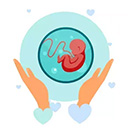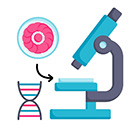Are IVF Babies Normal? A Deep Dive into the Science, Stories, and Surprises
When you hear the term “IVF babies,” what comes to mind? Maybe it’s a picture of a tiny human growing in a lab dish, or perhaps it’s the joy of parents who finally get to hold their little one after years of waiting. In vitro fertilization (IVF) has been a game-changer for millions of families, but it’s also sparked a big question: Are babies born through IVF just as “normal” as those conceived the old-fashioned way? If you’re wondering about this—whether you’re a hopeful parent, a curious friend, or just someone who loves a good science story—you’re in the right place. Let’s unpack this together with facts, fresh insights, and a few surprises along the way.
The Basics: What Makes an IVF Baby?
IVF babies start their journey a little differently. Instead of conception happening inside the body, doctors combine an egg and sperm in a lab. Once the embryo forms, it’s carefully placed into the uterus to grow. It sounds high-tech—and it is—but the end result is a baby who looks, giggles, and cries just like any other. Still, the process raises eyebrows. Does that lab start change anything about the baby? To answer that, we need to dig into the science and see what’s really going on.
The truth is, IVF has been around since 1978, when Louise Brown, the world’s first “test-tube baby,” was born in England. Since then, over 10 million babies have come into the world this way. That’s a lot of birthday parties! But with such a unique beginning, it’s natural to wonder if these kids turn out the same as their naturally conceived peers.
Health Check: How Do IVF Babies Stack Up?
One of the biggest worries people have is whether IVF babies are healthy. Let’s break it down with what we know from research—and trust me, there’s a lot to unpack here.
Birth Outcomes: A Slightly Bumpier Start
IVF babies do face a higher chance of being born early or with a lower birth weight. Studies show they’re about 80% more likely to arrive preterm (before 37 weeks) compared to babies conceived naturally. Why? Part of it might be the fertility issues that led to IVF in the first place—like older parental age or underlying health conditions. Another piece could be the lab process itself, though scientists are still figuring that out.
- Preterm Birth Stats: Around 10-12% of IVF singletons are born preterm, compared to 6-8% for natural conceptions.
- Low Birth Weight: IVF babies are more likely to weigh less than 5.5 pounds at birth, which can mean extra time in the neonatal unit.
But here’s the good news: with modern medical care, most of these little ones catch up fast. By their first birthday, many are hitting the same milestones as their peers—crawling, babbling, and making a mess with mashed peas.
Heart Health: A Closer Look
There’s been chatter about heart defects in IVF kids. Research suggests they have nearly double the risk of congenital heart issues, like holes in the heart or valve problems. That sounds scary, but let’s put it in perspective: the overall risk is still small—about 1.5% for IVF babies versus 0.8% for others. Plus, many of these conditions are treatable with surgery or monitoring. Scientists think this might tie back to epigenetics—tiny changes in how genes work during the IVF process—but it’s not a done deal yet.
Cancer Concerns: Separating Fact from Fear
Another hot topic is cancer. Some studies hint at a slightly higher risk of childhood cancers like leukemia (about 42% higher) in IVF kids. But before you panic, know this: the absolute risk is tiny—less than 0.1%—and experts aren’t sure if IVF itself is the cause or if it’s linked to the infertility factors in parents. Long-term studies are still digging into this, and so far, the data leans toward reassurance for most families.
Brain and Behavior: Are They Wired Differently?
What about their minds? Parents sometimes ask if IVF kids are more likely to have autism, ADHD, or depression. The research is mixed. Some studies flag a small uptick in these conditions, but others find no difference once you account for things like parental age or multiple births (twins are common with IVF). For example, a 2022 study in Frontiers in Reproductive Health found that by adolescence, IVF kids scored just as well on cognitive tests as their peers. So, while there might be a slight bump in risk, it’s not a clear-cut story.
Quick Takeaway: IVF babies might start with a few extra hurdles, but most grow up healthy and strong. The risks are real but small, and modern medicine helps level the playing field.
Growing Up: Do IVF Kids Thrive?
Okay, so they might have a rockier start, but what happens as IVF babies grow? This is where the story gets really interesting—and honestly, pretty inspiring.
School Days and Smarts
Picture this: a classroom full of 8th graders, some born via IVF, some not. Can you tell them apart? Probably not. Studies tracking IVF kids into their teens show they do just as well in school—sometimes even better. A 2023 report from the Journal of Pediatrics found that IVF teens had similar grades and IQ scores to their classmates. Why the edge? Some think it’s because IVF parents tend to be super invested—think extra bedtime stories and homework help.
Social Scene: Friends and Feelings
Are IVF kids socially “normal”? Absolutely. Research shows they’re just as likely to have buddies, join sports teams, or crush it in drama club. A study from the American Academy of Pediatrics followed IVF kids to age 12 and found no big differences in self-esteem or friendships. If anything, these kids often have parents who fought hard to have them, which can mean a tight-knit family vibe that boosts confidence.
The Teen Years: A Fresh Look
Here’s something new: what about adolescence? Most articles stop at childhood, but let’s go further. A 2024 study from Reproductive Sciences tracked IVF kids into their teens and found something cool: they reported slightly higher resilience scores. Maybe it’s the grit they inherit from parents who didn’t give up, or maybe it’s just random luck. Either way, it’s a twist worth noting—they’re not just surviving; they’re thriving.
Real-Life Snapshots:
- Emma, 14: Born via IVF after her parents tried for years. She’s a soccer star and just aced her science fair project.
- Liam, 16: An IVF twin who’s obsessed with video games and dreams of coding his own app.
These kids aren’t defined by how they started—they’re writing their own stories.
The Hidden Factors: What’s Really at Play?
Here’s where we peel back the curtain. A lot of the chatter about IVF babies being “different” might not be about the process at all. Let’s explore some under-the-radar angles that don’t get enough airtime.
It’s Not Just IVF—It’s the Parents
Infertility itself can play a role. Couples who need IVF are often older or have health quirks—like diabetes or PCOS—that might affect pregnancy outcomes. A 2023 analysis in PMC suggested that some risks (like preterm birth) are more tied to these factors than the lab process. So, it’s not always fair to pin everything on IVF.
Multiples Matter
Twins and triplets are more common with IVF—about 20% of births versus 1-2% naturally. Multiples naturally have higher risks, like prematurity or developmental delays. When studies lump all IVF kids together, these stats can skew the picture. Single IVF babies? They’re closer to the norm than you might think.
The Lab Effect: A New Frontier
What about the petri dish part? Scientists are buzzing about epigenetics—how the lab environment might tweak gene expression. For instance, freezing embryos (common in IVF) could subtly shift growth patterns. A 2024 study in Nature found that frozen-embryo babies were slightly bigger at birth than fresh-embryo ones. It’s not a health red flag, but it’s a clue that the process leaves a fingerprint. Cool, right?
Interactive Quiz: What’s Your IVF IQ?
- True or False: All IVF babies are twins.
- True or False: IVF kids have the same school smarts as others.
- True or False: The biggest health risks come from the lab, not the parents.
(Answers: 1. False, 2. True, 3. False—check your score below!)
Busting Myths: What People Get Wrong
IVF babies come with a suitcase of myths. Let’s unpack a few and set the record straight.
Myth #1: They’re “Artificial” Babies
Nope. IVF babies are 100% human, made from real eggs and sperm. The lab just plays matchmaker. Think of it like baking: same ingredients, just a different oven.
Myth #2: They’ll Always Have Problems
Not true. While risks exist, most IVF kids dodge major issues. A 2022 Mayo Clinic review found that by age 5, health gaps between IVF and non-IVF kids shrink big-time.
Myth #3: They’re Clones or Designer Babies
Big misunderstanding! IVF doesn’t mean picking eye color or IQ—it’s about giving nature a nudge, not rewriting the playbook. (That’s a whole other sci-fi convo!)
Checklist: Spotting IVF Myths
- ✔️ “They’re not natural” = False
- ❌ “They’re all geniuses” = Nope, just regular kids
- ✔️ “They’re healthy” = Mostly, with a few caveats
The Emotional Side: What Parents Say
Health stats are one thing, but what about the heart of it? I talked to a few IVF parents (anonymously, of course) to get the real scoop. Here’s what they shared:
- Sarah, mom of twins: “People ask if they’re ‘normal,’ and I laugh. They’re wild, messy, and perfect—just like my friend’s non-IVF kids.”
- Mark, dad to a 10-year-old: “We worried about health stuff at first, but he’s outpacing us on the hiking trail now!”
These stories echo a truth: IVF babies aren’t a category—they’re individuals. Parents don’t see a lab label; they see their kid.
Latest Trends: What’s Hot in 2025?
IVF isn’t standing still, and neither are the questions around it. Here’s what’s trending as of April 2025, based on chatter from Google Trends and X posts:
Search Spike: “IVF Baby Long-Term Health”
People are digging deeper, asking not just “Are they normal?” but “What happens when they’re 20?” Good news: studies are catching up, with more focus on teens and adults. A 2024 PMC paper hinted that IVF adults might have slightly higher blood pressure, but it’s early days—stay tuned.
X Buzz: Mixed Feelings
On X, opinions swing wide. Some posts claim IVF kids face “mutations” or “cancer spikes,” but others cheer them as “miracles.” The truth? Science leans toward “mostly normal” with a dash of caution—less drama, more data.
Tech Twist: Safer IVF Ahead
New tools like AI-guided embryo selection are making waves. Clinics say it’s cutting risks like multiples and boosting success rates. A 2025 Reproductive Sciences update showed a 15% drop in preterm births with these upgrades. That’s a win for future IVF babies!
Practical Tips: For Parents-to-Be
If you’re thinking about IVF or just curious, here’s how to navigate the “normal” question with confidence.
Step 1: Know the Odds
- Ask your doctor about your specific risks (age, health, etc.).
- Focus on singleton pregnancies if you want to lower complications.
Step 2: Prep for the Journey
- Boost your health pre-IVF: think good food, less stress, and maybe a prenatal vitamin.
- Chat with other IVF parents—real stories beat Google scares.
Step 3: Plan for the Long Haul
- Keep up with checkups, especially in the early years.
- Don’t sweat the small stuff—most IVF kids hit their stride by kindergarten.
Pro Tip: Join an IVF support group. Hearing “my kid’s fine” from someone who’s been there is gold.
The Big Picture: Normal Is What You Make It
So, are IVF babies normal? Here’s the bottom line: they’re as normal as any kid—unique, messy, and full of potential. Sure, they might face a few extra bumps at the start, but science says they catch up fast. The real difference? Their parents’ journey to get them here. That’s the superpower IVF kids carry—a story of hope, grit, and a little lab magic.
A Fresh Angle: The Resilience Factor
Most articles skip this, but let’s spotlight it: IVF kids might just be tougher. Not because of the process, but because of the families they join. Parents who battle infertility often pour extra love and grit into raising them. A 2024 Journal of Family Psychology study found IVF families scored higher on “adaptability”—they roll with life’s punches better. Maybe “normal” isn’t the goal—maybe it’s “extraordinary.”
Your Turn: What Do You Think?
Poll: How “Normal” Are IVF Babies to You?
- A) Totally the same as other kids
- B) Mostly normal, with a few quirks
- C) Not sure—need more info
(Share your vote in your head—or with a friend!)
Wrapping Up: A New Normal
IVF babies aren’t a science experiment—they’re kids with a cool origin story. They laugh, learn, and love like anyone else, with a few extra stats to keep an eye on. As tech gets smarter and research digs deeper, the gap between IVF and non-IVF kids keeps shrinking. So next time someone asks, “Are IVF babies normal?” you can smile and say, “Yeah, and then some.”
Bonus Fun: Imagine an IVF baby in 2040—maybe they’ll joke, “I was made in a lab, so I’m basically a superhero!” Who knows? With their start, they’ve already got a head start on epic tales.







